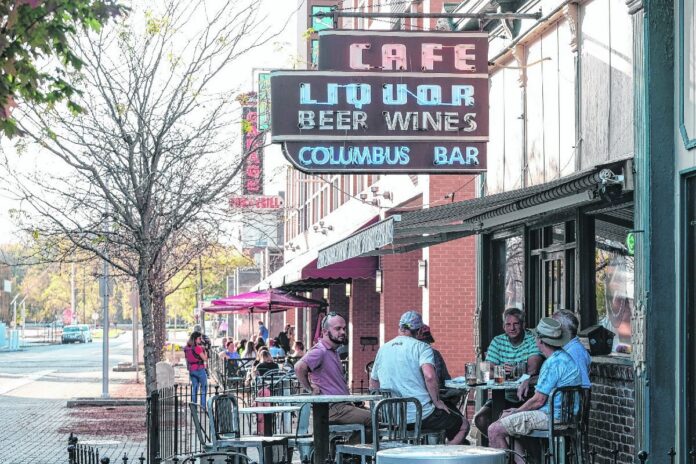
As the days get shorter and the nights become colder, change is in the air for local restaurants.
Outdoor seating has been a godsend to many restaurants over the summer, as many customers felt more safe and comfortable dining outside as opposed to indoors.
Paul Heilbrunn, owner of Bucceto’s Smiling Teeth Pizza and Pasta, said outdoor seating has “dramatically impacted” his business and been a “savior” amid the pandemic.
In June, the city approved a request by a group of downtown restaurants, including Bucceto’s, to close the street from 4 p.m. to midnight on Fridays and Saturdays through Oct. 31 to allow for additional outdoor seating.
[sc:text-divider text-divider-title=”Story continues below gallery” ]Click here to purchase photos from this gallery
Tyler Hodge, co-founder and co-owner of Lucabe Coffee, said the community responded well to the change.
“It’s actually been really good to have a draw for downtown,” he said. “We set out, in the beginning, to not simply plead for people to come buy from restaurants downtown, but to make it an attraction, so to speak, something that would be desirable and enjoyable and create an atmosphere.”
Lucabe’s, in particular, has adjusted for these weekend evenings, adding later hours on Fridays and Saturdays and offering new dessert items. Hodge said that he hopes to continue both of these changes, though the night hours may need to be adjusted due to the days getting shorter and lower business traffic from 8 to 9 p.m.
Seeking an extension
Downtown restaurants are looking into requesting an extension for the Fourth Street closure but are also waiting to see how outdoor seating fares through the end of October.
During the summer, the city also approved a request from Fourth Street Bar and Grill to add additional seating on the sidewalk next to the restaurant’s patio. On Oct. 20, the board of works approved the restaurant’s request to continue that outdoor seating extension through the end of the year.
“We’ve had a number of customers tell us that they would still like to sit outside … that they would wear a jacket, they would bring a stadium blanket,” said Kurt Schwarze, the restaurant’s co-owner. “And we’ve told them, as long as we can continue serving outside, we will.”
Hodge also said he is looking into ways to lengthen the outdoor seating “season.”
“We’ve been working in conjunction with the (Columbus) Visitors Center to identify ways that may make sense,” he said. “… They had brought up that several European countries and some other areas, they’ve been instituting campaigns like ‘bring your own blanket.’”
Another possibility is using outdoor patio heaters, but units can range from $150 to $600 and use up a lot of fuel, he said.
“Luciana’s said that they go through a can of propane per heater every three to four hours,” he said.
With the weather getting colder, restaurants will have to see whether customers become more or less comfortable moving inside. Even then, capacity is still limited due to social distancing requirements.
Schwarze said that with these requirements, he’s only able to offer 75% capacity for his dining rooms.
“When we’re not able to operate at 100%, essentially we’re losing money,” he said. “We’ve been losing money every day since March, and we expect that to continue. It doesn’t really matter what we’re able to do, as far as what the state says; it matters what our customers are comfortable doing.”
Schwarze said that while he is able to offer 75% of his usual capacity, he’s actually only seeing about 50% capacity, and people don’t tend to come in large groups.
However, he said that people are starting to feel a bit more comfortable when it comes to businesses that are taking precautions.
“At Fourth Street, we’ve tried to be safe all along,” he said. “All of our staff are still wearing masks 100% of the time, we still do temperature checks every shift as our employees come in. We’ve replaced all of our indoor HVAC air filters with high MERV air filters. We’ve increased the amount of fresh air that gets introduced into our HVAC system instead of the amount that is recycled.”
Carry-out customers
In addition to seeking ways to attract dine-in customers, businesses are also looking to pick up more carryout business in the winter months.
Bucceto’s plans to start using new online ordering system within the next month that should be better than their current system, Heilbrunn said.
Schwarze said that his restaurant’s full menu is available for carryout, and that they’re also offering online ordering and curbside pickup.
“We certainly hope some of that returns here during the winter, if people aren’t comfortable going out, that they realize whether it’s 4th Street or somewhere else … their favorite place may not be able to survive the winter without the carryout business,” he said.
Winter weather isn’t the only challenge facing these restaurants, however.
“The thing that has hurt us the most has been Cummins being closed,” said Heilbrunn.
Prior to the pandemic, Bucceto’s was unique in that it had a busier lunchtime rush due to Cummins, Heilbrunn said. However, as fewer of the company’s employees are working downtown, that rush has slowed, though he added it’s somewhat better now.
Schwarze said that for his restaurant, a “nonexistent” lunch rush makes it harder to stay open throughout the day.
“We haven’t seen a lunchtime rush since March,” he said. “There are far fewer people working downtown, and those who are working are working abbreviated hours. And then they come downtown for an hour or two. You know, out on the patio, during the summer … if the weather was perfect, we saw a decent lunch business outside but very little inside.”
Many businesses are 20% to 30% below last year in sales, and the reduced downtown presence from Cummins is the primary reason for the drop, Hodge said. While people are starting to return slowly, there is still a “fundamental change to the makeup of downtown,” he said.
Businesses may need to have discussions with their landlords about whether or not rent should change due to these market changes, particularly if Cummins decides to further reduce its presence downtown, he said.
In March, the Columbus Redevelopment Commission voted not to charge rent for all six of its restaurant tenants for April and May. These tenants are Lucabe Coffee; Luciana’s Mexican Restaurant and Cantina; Bucceto’s Pizza and Pasta; Subway; Orange Leaf; and the Garage Pub and Grill.
In late May, the commission approved additional relief. Sarah Cannon, commission president, said that the tenants would receive full rent abatement in June and July and a 75% abatement from August to December (meaning that they would pay 25% of their rent during those months).
In late July, the commission approved a resolution to provide Orange Leaf and Subway, the two interior Commons restaurants, with continued 100% rent abatement until The Commons reopens. Unlike Luciana’s and Bucceto’s, Orange Leaf and Subway have no exterior entrances and have been closed since March, when The Commons initially closed due to the pandemic.
“That has helped tremendously, to have the city as our landlord, so we’re really thankful for that. And it’s going to be rough, if and when it ends, but we’re just grateful for what the city has done for us, In regards to the rent abatement, Heilbrunn said.
Help from the city?
Hodge said that several businesses, including his own, have written a letter to city asking them to take a cue from other cities and create a grant program. These businesses propose that the city use the leftover funds from its loan program and turn the money into grants to help businesses extend the outdoor seating season.
“The Paycheck Protection Program and the CARES Act really helped businesses in the first two to three months of the pandemic,” Hodge said. “But by June and early July, many of those businesses had already run through those funds. So, you know, the past three to four months really have been solely on our own, with no end in sight.”
Even with business picking back up slowly over the past several months, Hodge expects that “lowered revenue will continue to be a challenge well into next spring.” It’s possible his coffee shop might tweak its schedule if necessary.
“No one wants to close their business. No one wants to really reduce their service offerings, but at the end of the day, you also have to make sure that the business survives too,” he said. “And that’s a balance, that’s a really tricky balance for a lot of folks.”
When asked if there was a chance of the Fourth Street Bar and Grill closing for the winter, Schwarze replied, “There’s always a chance.”
If carryout isn’t successful or the pandemic worsens, closing for the winter could be a possibility.
“This is the first time since I’ve been in business — which has been oh, what, 22 years — that I don’t really feel in control of my business,” he said.
Heilbrunn said that if Bucceto’s decides to shut its doors, it would likely be for longer than just the winter.
“If we close, which is a possibility, we’ll probably close for good,” he said. “I mean, it wouldn’t be feasible to close for the winter. We would lose all our staff, because they’re going to have to find other jobs. You know, it’d be starting all over.”
When asked how he felt about the future, Hodge replied, “This is going to sound hokey, but I’m always optimistic about the American comeback. I’m always hopeful, looking at our history as a country to be able to be resilient and respond and come back and being even stronger than before. I think the real big question is, that’s at a macro level. … What does that look like on a micro level? What does that look like here in Columbus?”




